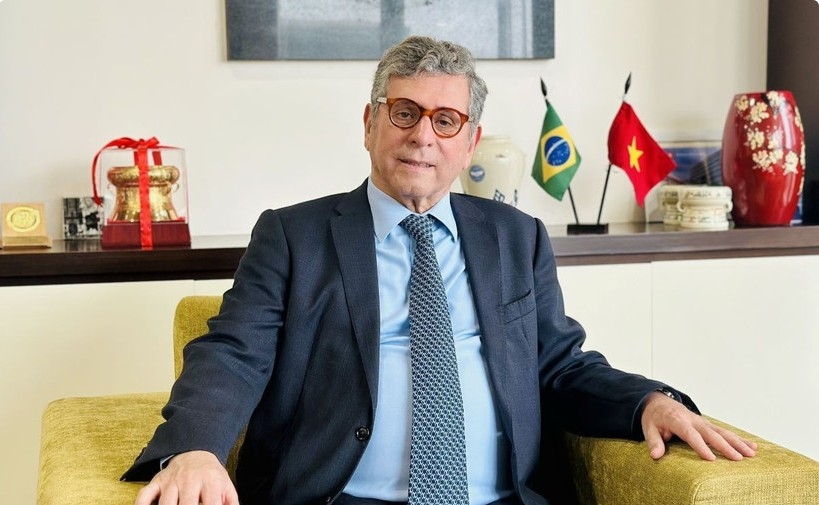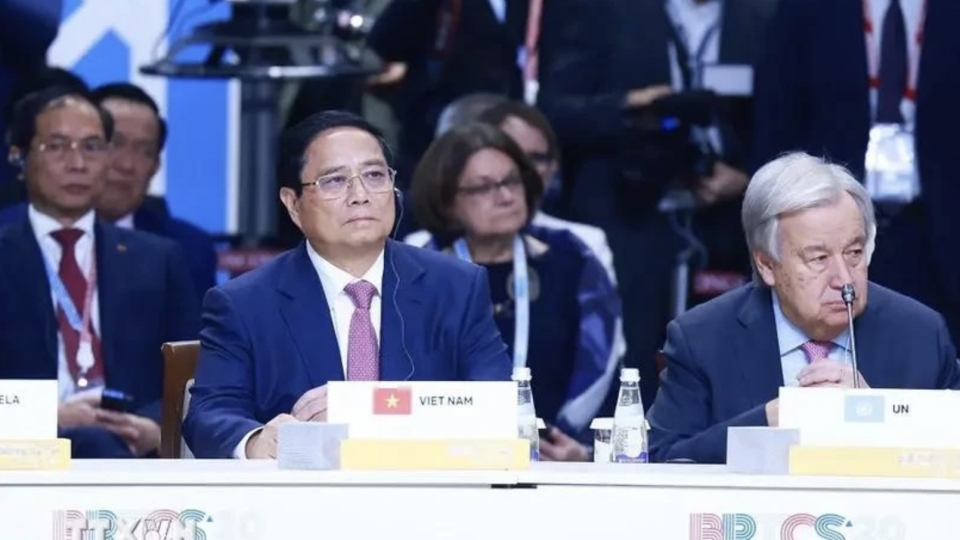Brazilian Ambassador: Vietnam to make valuable contributions to BRICS+ Summit
VOV.VN - Brazilian Ambassador Marco Farani has expressed confidence that Vietnam will make valuable contributions to the expanded BRICS Summit (BRICS+), citing the country’s proactive role in global trade and at multilateral forums.

According to the Ministry of Foreign Affairs, Prime Minister Pham Minh Chinh and his spouse will lead a high-level Vietnamese delegation to attend the 2025 expanded BRICS Summit (BRICS+) and carry out bilateral activities in Brazil from July 4 to 8 at the invitation of Brazilian President Luiz Inácio Lula da Silva.
Ahead of the summit, Brazilian Ambassador to Vietnam Marco Farani spoke to the press about Vietnam–Brazil relations and Vietnam’s role in BRICS.
Ambassador Farani stated that the Brazilian government, as the rotating Chair of BRICS, was pleased to welcome Vietnam’s official participation in the group as a “partner country.” He said this development would help strengthen BRICS' overall capacity, reaffirm its international standing and influence in global trade value chains, and reinforce the importance of multilateralism.
He described Vietnam as a stable country with a dynamic and efficient economy, clear growth objectives, and smooth integration into global value chains. Vietnam’s recognition as a BRICS partner has been warmly welcomed, and Brazil expects the country to take an active role in advancing common goals in trade, investment, energy transition, environmental and social sustainability, connectivity, and equal access to innovation.
In the context of rising global instability, ongoing conflicts, economic turbulence, and a resurgence of protectionism that disrupts trade flows and global prosperity, BRICS plays an increasingly essential role.
Some key figures demonstrate the group’s potential. BRICS accounts for 40% of the global economy, 23% of world GDP, 18% of international trade, 42% of the global population, 30% of the world’s land area (around 3.2 billion people), 36% of global GDP in purchasing power parity (PPP) terms, and 72% of global rare earth reserves.
According to the latest data from the International Monetary Fund, while industrialized economies are seeing slower growth, from 2.7% in 2022 to 1.4% in 2023, developing countries in the Global South are expected to grow by around 4% this year. The emerging economies of BRICS continue to stand out as the fastest-growing regions in the world.
Ambassador Farani expressed strong expectations for Prime Minister Pham Minh Chinh’s upcoming visit to Brazil, his third trip to the country. He said the visit would be a great honor for Brazil and reflects the high level of mutual trust and the special significance of bilateral ties.
The Vietnamese Government leader first visited Brazil in 2023, marking the start of a new phase in bilateral relations. During that visit, he held talks with President Lula da Silva, visited major Brazilian enterprises, and met with business leaders.
In 2024, he returned to Brazil to attend the G20 Summit in Rio de Janeiro, where he and the Vietnamese delegation explored cooperation opportunities in areas such as sports, aviation, high-tech agriculture, and energy transition. On that occasion, the two leaders announced the establishment of a Strategic Partnership, opening a new chapter in bilateral cooperation.
This year, Prime Minister Chinh returns to Brazil to attend the expanded BRICS Summit as the head of a partner country. Ambassador Farani expressed confidence that PM Chinh would offer valuable contributions to the summit’s discussions. With a modern vision and international experience, the Vietnamese Government chief is expected to bring constructive ideas on critical issues for developing countries, including energy transition, economic and financial cooperation, and equitable access to innovation.
Regarding Vietnam–BRICS cooperation in 2025 and the years ahead, Ambassador Farani noted that BRICS includes some of the world’s leading emerging economies and focuses on tackling key development bottlenecks. Its agenda consistently features trade partnerships, access to advanced technology, improved connectivity, and infrastructure investment.
Vietnam, he said, can make meaningful contributions to the BRICS agenda. The country is a model of dynamism, growth, and stability, while striving to balance development goals with sustainable socio-economic and environmental policies. These priorities are consistent with BRICS’ orientations and practices, and contribute to stronger multilateral cooperation.
In addition to trade and supply chain connectivity, Vietnam could cooperate with other BRICS members in environmental protection, energy transition, and technological innovation. Politically and diplomatically, like Brazil, Vietnam is committed to promoting global peace and stability and supports a more representative global governance system.
The 17th BRICS Summit themed “Strengthening South–South Cooperation for More Inclusive and Sustainable Governance”will be held in Rio de Janeiro from July 6 to 7 under Brazil’s chairmanship.
Discussions will focus on six main topics: reform of the multilateral peace and security architecture, cooperation in healthcare, improvements to the international financial system, responses to the climate crisis, artificial intelligence, and institutional strengthening of BRICS with expanded dialogue involving various social groups.
Reflecting on bilateral ties, Ambassador Farani said Brazil and Vietnam have maintained a positive, balanced political and economic relationship over the past 36 years since the establishment of diplomatic ties. In recent years, however, the relationship has made notable progress, fueled by high-level visits and mutual efforts to broaden cooperation.
Bilateral trade has reached a record US$8 billion. Scientific and technological dialogue has expanded, a defense cooperation action plan has been signed, and co-operation in high-tech agriculture has deepened. Energy transition has become an important area of joint focus.
This year marked a major milestone with President Lula da Silva’s State visit to Vietnam in March, accompanied by a large business delegation and senior officials from Brazil’s National Congress and government. During the visit, the two governments issued a Joint Statement outlining specific steps such as opening the Vietnamese market to Brazilian beef, recognizing Vietnam’s market economy status, and gradually implementing the Strategic Partnership Action Plan.
In 2025, the two countries will continue to carry out the plan’s targets, including gradually expanding two-way market access. Ambassador Farani emphasized that Brazil and Vietnam share many complementarities that support the development of a sustainable and resilient partnership.
He said both countries have strong prospects for co-operation in energy transition, an area where Brazil has practical experience and global leadership in renewable energy and ethanol. Cooperation in high-tech agriculture is also promising. JBS, one of Brazil’s largest agribusinesses, has announced plans to invest US$100 million to build two meat processing plants in Vietnam. The project could help turn Vietnam into a regional distribution hub in Southeast Asia.
Beyond that, the two countries boast huge potential for cooperation in cybersecurity, semiconductors, digital transformation, green agriculture, biofuels, and new farming technologies, including forest restoration.
Farani expressed confidence that the current momentum in high-level dialogue will continue to yield concrete results in both bilateral and multilateral cooperation in the years to come.




